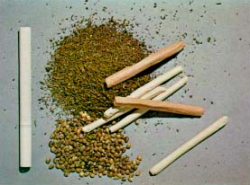Pros and Cons of Medication-Assisted Treatment for Opium Addiction
According to the NIDA, “Medications can be used to help with different aspects of the treatment process,” like withdrawal and eventual addiction treatment. But there are some downsides to medication-assisted treatment as well. Which type of treatment is better? All in all, the success of the treatment depends most on the needs of the patient.
Pros of Medication-Assisted Treatment for Opium Addiction
As stated by SAMHSA, “Management of withdrawal without medications can produce needless suffering in a population that tends to have limited tolerance for physical pain.” And while medications are beneficial during withdrawal to help patients through the painful and difficult symptoms, they have also been proven to be effective with treating addiction to opium and other opioid drugs as well.

There are a variety of medications that assist with opium addiction.
Some of the pros of medication-assisted treatment for opium addiction are:
- There are several different choices for medications, and each one is better suited for a certain situation and patient.
- Methadone- beneficial for chronic opium addicts who need long-term maintenance
- Buprenorphine- beneficial for both chronic opium addicts and recreational users who want to stop their abuse of opium quickly
- Naltrexone- beneficial for those who can follow a strict set of rules and want to stop abusing opium quickly
- The medications that treat opium and other types of opioid abuse and addiction are available in many ways. For example, methadone is only available through outpatient clinics, but buprenorphine can be prescribed in a doctor’s office.
- According to the CDC, Methadone as a treatment tool often diminishes the likelihood of other issues persisting or occurring in lives of opium addicts, including:
- Relapse
- Abusing injection drugs
- Death
- Overdose
- Criminal activity
- Pregnancy issues
- Disease transmission
- Medication is often used in treatment facilities to keep patients in treatment longer and to help them focus on their behavioral therapies, which are extremely beneficial.
- According to the NIDA, “Medications can be used to help reestablish normal brain function… and diminish cravings.”
Harvard Medical School states that, of patients who attend methadone maintenance treatment, “it has been established that about 25% of patients eventually become abstinent, 25% continue to take the drug, and 50% go on and off methadone repeatedly.” This are actually solid results when compared with other treatments. But there are some downsides to medication-assisted treatment.
Cons of Medication-Assisted Treatment for Opium Addiction
While there are many pros to medication-assisted treatment, there are cons as well. As stated by Harvard Medical School, methadone “is still politically controversial,” as many individuals believe that the only solution to opium and other types of drug abuse is abstinence.
Other cons of medication-assisted treatment for opium addiction include:
- The possibility for abuse of the medications, which does occur: the NIDA states, “Recent reports have highlighted the potential dangers, including death, of the improper use (or abuse) of methadone.”
- Many patients forget that medically-assisted detox is not treatment and that they are not cured of their addictions simply by being treated with medication for withdrawal and getting through that time.
- Behavioral therapies are often even more effective for treating opium addiction and should absolutely be a part of treatment, but sometimes, the use of medication can overshadow the importance therapy.
 Taking the Step: Opiate Detox and Recovery -
Opiate detox is the first stage in recovery from an opiate addiction. Detox is the period in which a person goes through withdrawal, and it is best done in treatment.
Taking the Step: Opiate Detox and Recovery -
Opiate detox is the first stage in recovery from an opiate addiction. Detox is the period in which a person goes through withdrawal, and it is best done in treatment.  Is There Treatment for Opiate Tolerance? -
Opiate tolerance is very dangerous as it can lead to dependence and addiction. The current treatments for tolerance are switching to another opiate, using antagonists, and limiting dosages.
Is There Treatment for Opiate Tolerance? -
Opiate tolerance is very dangerous as it can lead to dependence and addiction. The current treatments for tolerance are switching to another opiate, using antagonists, and limiting dosages.  Can’t I Just Quit on My Own? And Other Common Questions Preventing You from Seeking Treatment for Opiate Addiction -
Once you know what to expect, opiate addiction treatment won't seem so scary or difficult.
Can’t I Just Quit on My Own? And Other Common Questions Preventing You from Seeking Treatment for Opiate Addiction -
Once you know what to expect, opiate addiction treatment won't seem so scary or difficult.  Heroin versus Opium Treatment: Is there a Difference? -
Heroin and opium treatment are similar but there are important differences to be aware of.
Heroin versus Opium Treatment: Is there a Difference? -
Heroin and opium treatment are similar but there are important differences to be aware of.  Funding Your Opiate Addiction Treatment -
If you can't afford opiate addiction treatment, there are options available to get you the help you need.
Funding Your Opiate Addiction Treatment -
If you can't afford opiate addiction treatment, there are options available to get you the help you need.